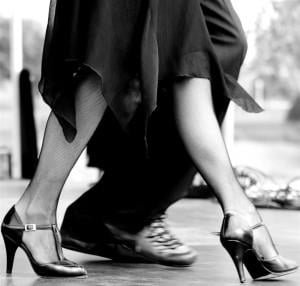Learn about the many benefits of Ballroom Dance
What is Social Dancing?
“Social dance” is a term for partner-based dance styles which is also referred to as Ballroom dance or Latin dance. However it may be called, social dancing is about partnership, enjoyment, and exercise. Also, Ballroom and Latin dancing is perhaps the most elegant and well-respected social activity in the world! Everyone can learn, and Lakeside Dance is Barrie’s best choice for getting you on the dance floor to success! In addition, read more about the Benefits of Social Dancing, and learn why “Dancing Makes You Smarter”, an article by Richard Powers.

— Richard Powers
- Ballroom Dance is one of the most effective physical activities for enhancing the brain, therefore making you smarter.
- Dancing is a lifetime investment, building confidence, style and comfort on any dance floor.
- Increased flexibility and balance can prevent possible injury, especially later in life.
- Dancing requires good posture. Your immune system depends greatly on the health of your spine, thus better posture means a stronger immune system.
- Reduces stress from your daily routine.
- Dancing can burn 300-500 calories an hour, more than riding a bike or swimming.
- Social dancing is a great way to meet new people. Have weekly dance classes and events to attend.
- Rekindle the fire in your relationship. Partner dancing relies on connection and communication with your partner, and builds trust.
- Studies show that dancing often can lower your risk of heart disease, control blood pressure, help control weight, strengthen bones, legs and hips.

Dance Classes Keep The Mind Healthy And Youthful
Dancing Makes You Smarter
By: Richard Powers – Stanford Dance
For centuries, dance manuals and other writings have lauded the health benefits of dancing, usually as physical exercise. More recently we’ve seen research on further health benefits of dancing, such as stress reduction and increased serotonin level, with its sense of well-being.
Then most recently we’ve heard of another benefit: Frequent dancing apparently makes us smarter. A major study added to the growing evidence that stimulating one’s mind can ward off Alzheimer’s disease and other dementia, much as physical exercise can keep the body fit. Dancing also increases cognitive acuity at all ages.
Report on the effects of recreational activities on mental acuity in aging
You may have heard about the New England Journal of Medicine report on the effects of recreational activities on mental acuity in aging. Here it is in a nutshell.
The 21-year study of senior citizens, 75 and older, was led by the Albert Einstein College of Medicine in New York City, funded by the National Institute on Aging, and published in the New England Journal of Medicine. Their method for objectively measuring mental acuity in aging was to monitor rates of dementia, including Alzheimer’s disease.
The study wanted to see if any physical or cognitive recreational activities influenced mental acuity. They discovered that some activities had a significant beneficial effect. Other activities had none.
They studied cognitive activities such as reading books, writing for pleasure, doing crossword puzzles, playing cards and playing musical instruments. And they studied physical activities like playing tennis or golf, swimming, bicycling, dancing, walking for exercise and doing housework.
One of the surprises of the study was that almost none of the physical activities appeared to offer any protection against dementia. There can be cardiovascular benefits of course, but the focus of this study was the mind. There was one important exception: the only physical activity to offer protection against dementia was frequent dancing.
New England Journal of Medicine Report
Reading – 35% reduced risk of dementia
Bicycling and swimming – 0%
Doing crossword puzzles at least four days a week – 47%
Playing golf – 0%
Dancing frequently – 76%
That was the greatest risk reduction of any activity studied, cognitive or physical.
Quoting Dr. Joseph Coyle, a Harvard Medical School psychiatrist who wrote an accompanying commentary: “The cerebral cortex and hippocampus, which are critical to these activities, are remarkably plastic, and they rewire themselves based upon their use.”
And from from the study itself, Dr. Katzman proposed these persons are more resistant to the effects of dementia as a result of having greater cognitive reserve and increased complexity of neuronal synapses. Like education, participation in some leisure activities lowers the risk of dementia by improving cognitive reserve.
Our brain constantly rewires its neural pathways, as needed. If it doesn’t need to, then it won’t. Continue Reading >>
1 | 2
Did You Know?
Adults who Ballroom dance frequently can reduce the risk of dementia by up to 76%!
Don’t wait, sign up today! Try our 2 ballroom dance classes Intro Offer!
At Lakeside Dance…
We teach social dance, which is more relaxed and meant for enjoyment, compared to international style which focuses more on technical aspects of dancing. We have a unique method which develops primary dance skills first, so that you may begin using your dancing from your very first lesson! Lastly, your learning will progress faster as you attend group classes and practice parties. Start Dancing Today!

